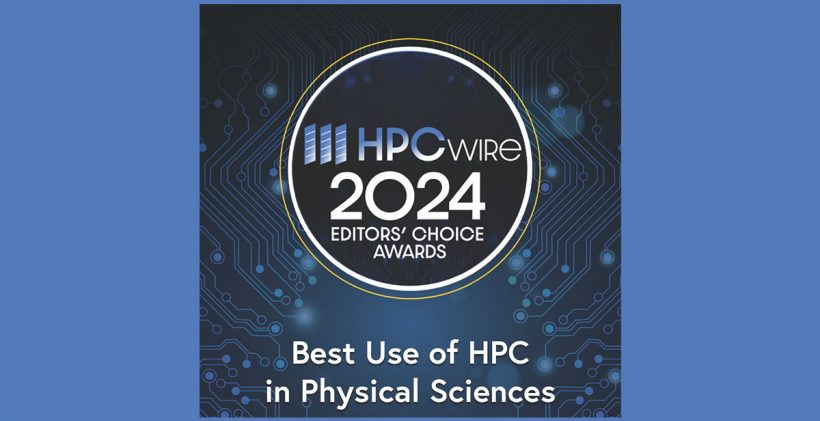Six awards spotlight advancements in AI, data analysis, and supercomputing
Scientists at the U.S. Department of Energy’s (DOE) Argonne National Laboratory were recognized for their achievements in high performance computing (HPC) with six HPCwire Awards. The awards were announced at the SC24 conference.
Here are the awards that spotlight Argonne’s advancements.
Editors’ Choice: Best Use of HPC in Physical Sciences
Scientists at Argonne National Laboratory, University of Chicago, University of Illinois-Urbana Champaign, National Center for Supercomputing Applications (NCSA), and University of Minnesota used the Globus platform for data management, the Polaris supercomputer at the Argonne Leadership Computing Facility (ALCF), and the Delta and DeltaAI supercomputers at NCSA in developing a physics-informed transformer model to predict gravitational wave evolution for spinning binary black hole mergers, including higher-order modes. This AI approach dramatically reduces simulation time from days to seconds, handling terabyte-scale datasets with high accuracy.
“Our work exemplifies the power of AI in science—driving faster, more accurate predictions and unlocking new possibilities for both theoretical research and observational astrophysics,” said Principal Investigator Eliu Huerta, lead for translational AI and computational scientist at Argonne. “Equally important, it highlights the critical role of young scientists with AI expertise in tackling grand challenges like these.”
Editors’ Choice: Best HPC Response to Societal Plight
The Open Science Platform OSPREY aims to enhance pandemic response by enabling health officials to utilize high performance computing (HPC) resources and data-driven decision-making. With support from Argonne and the University of Chicago, the researchers used Globus, Parsl, and EMEWS (Extreme-scale Model Exploration with Swift) to integrate automated workflows, data curation, and model management to facilitate rapid collaboration and development during health crises.
Readers’ Choice: Best HPC In the Cloud (Use Case)
Globus enabled near-real-time data analysis at Argonne by connecting instruments at Argonne’s Advanced Photon Source with ALCF supercomputers. This automated pipeline allows scientists to adjust experiments on the fly, potentially accelerating scientific breakthroughs by delivering rapid results while researchers still have facility access.
Readers’ Choice: Best Use of High Performance Data Analytics & Artificial Intelligence
Argonne and Dow Inc. developed a framework combining computational fluid dynamics (CFD) with an active machine learning optimizer (ActivO) for efficient turbulent jet mixer design. This novel approach optimized jet-mixing technology, potentially reducing reliability issues and costs associated with traditional agitators, with estimated savings of up to $6.1 million per year per plant.
Readers’ Choice: Best Use of HPC in Industry (Automotive, Aerospace, Manufacturing, Chemical, etc.)
Argonne and RTX Technology Research Center used HPC and CFD modeling to simulate gas turbine film cooling with surface roughness defects. They employed Argonne’s GPU-accelerated NekRS solver on DOE supercomputers, providing high-fidelity data for developing surrogate models to optimize thermal management in next-generation aircraft engines.
Readers’ Choice: Top Supercomputing Achievement
The Aurora supercomputer at Argonne showcases AI’s growing impact in supercomputing. With its massive GPU cluster and advanced interconnect, Aurora enables AI-driven research across fields like neuroscience, particle physics, and drug discovery. This system demonstrates how AI can be effectively implemented for high-performance computing, accelerating scientific breakthroughs.

